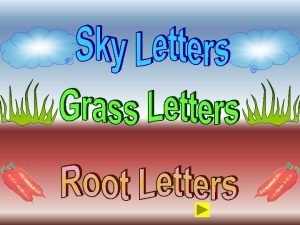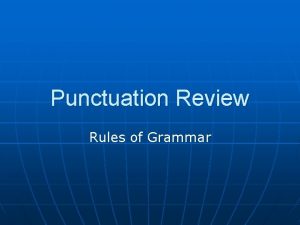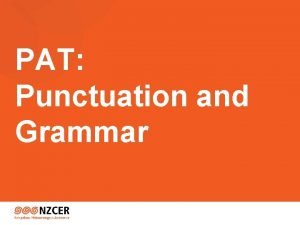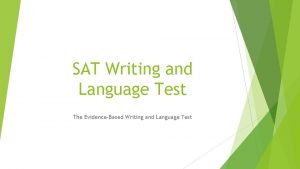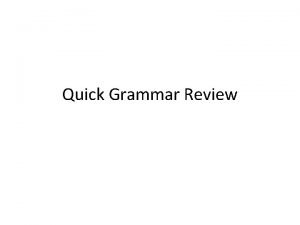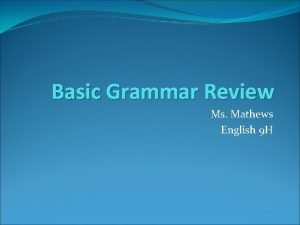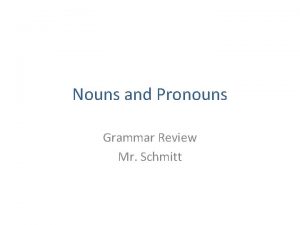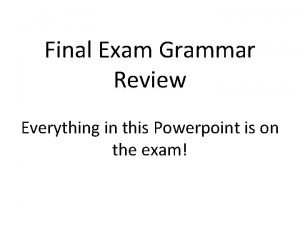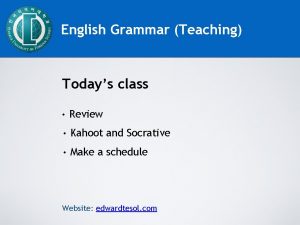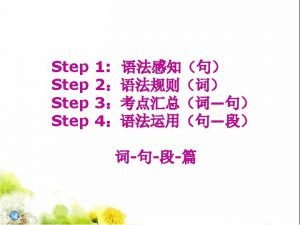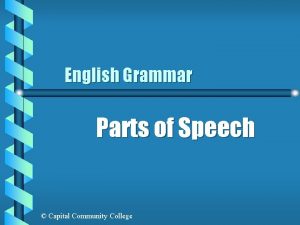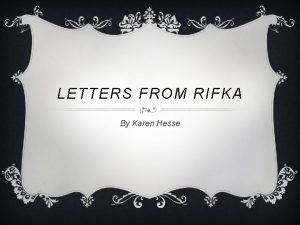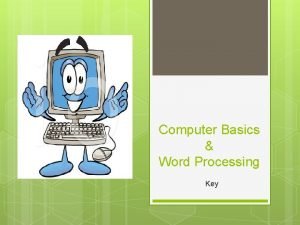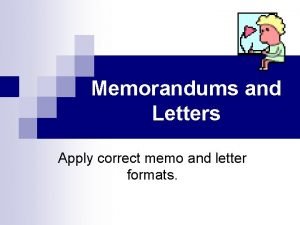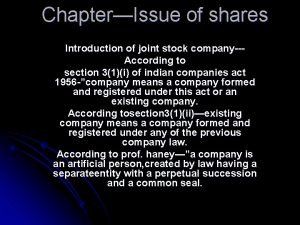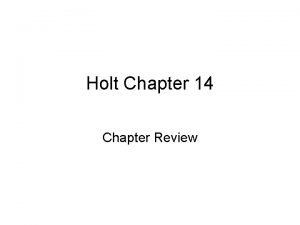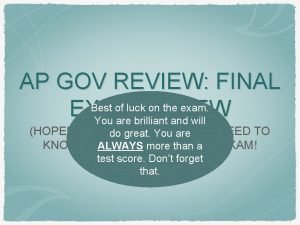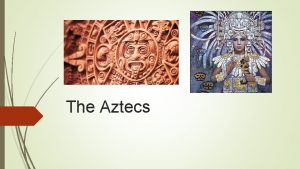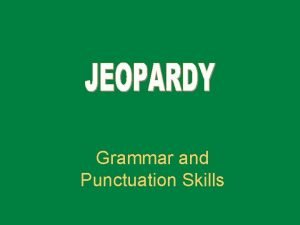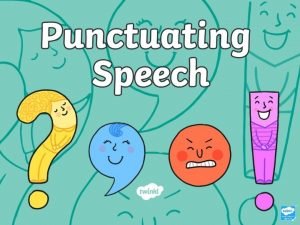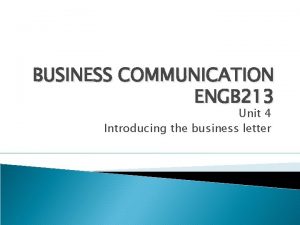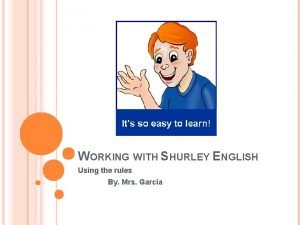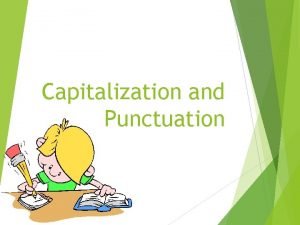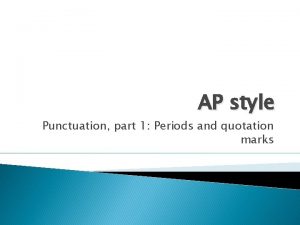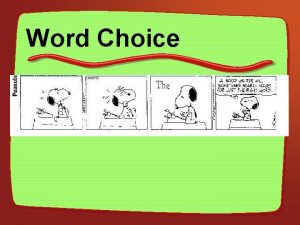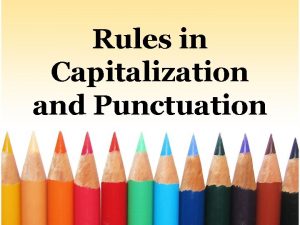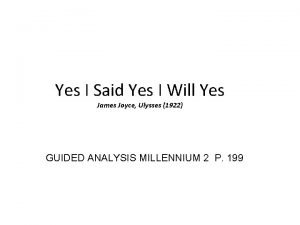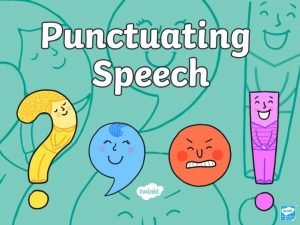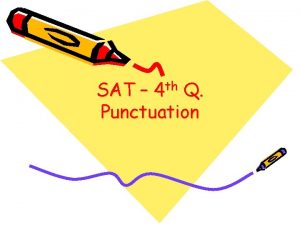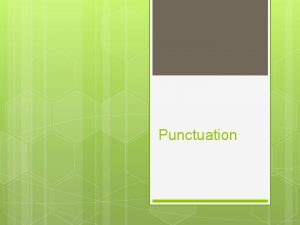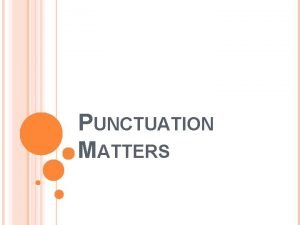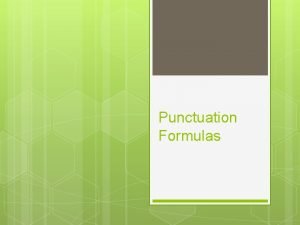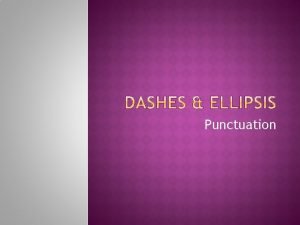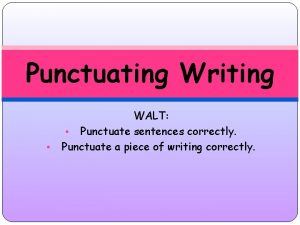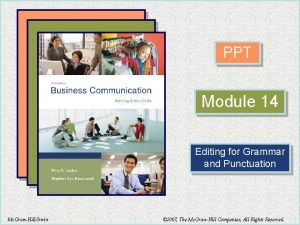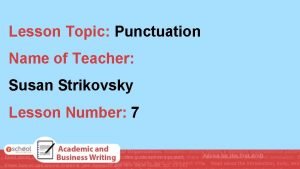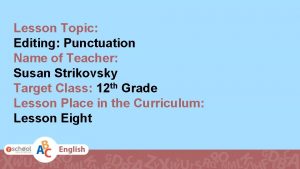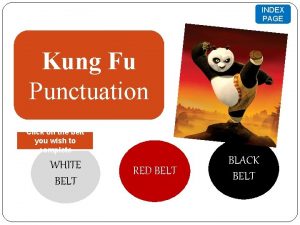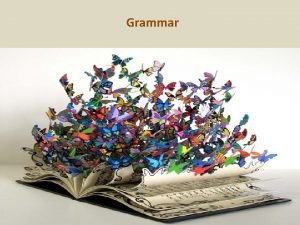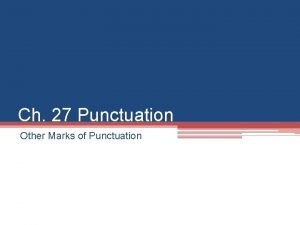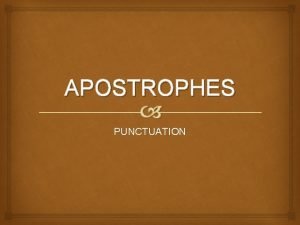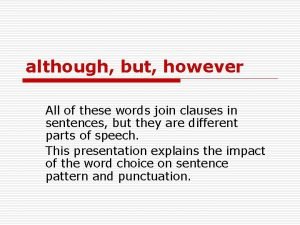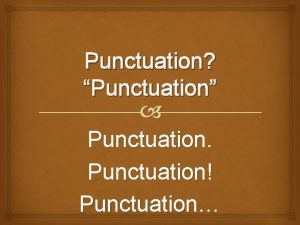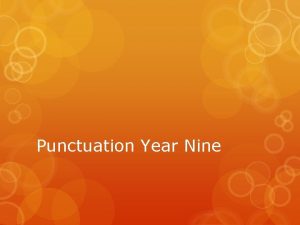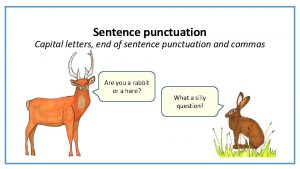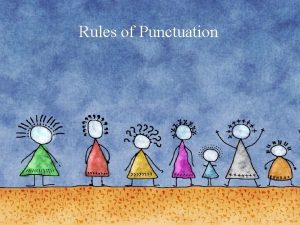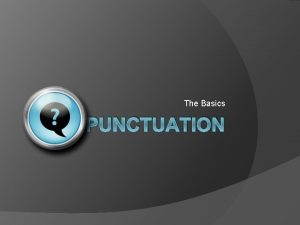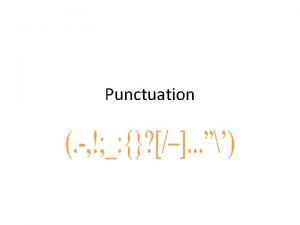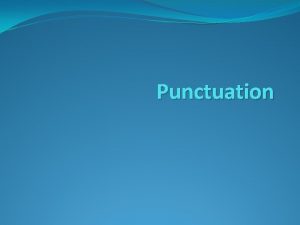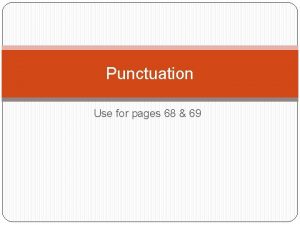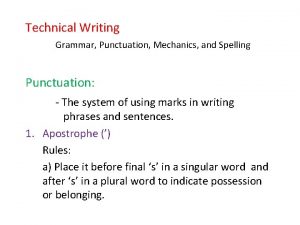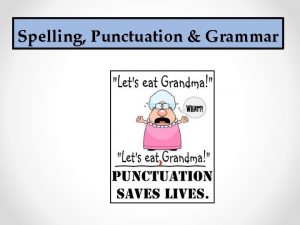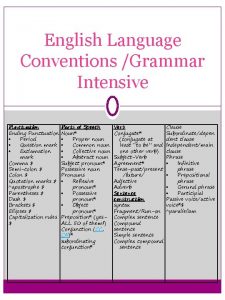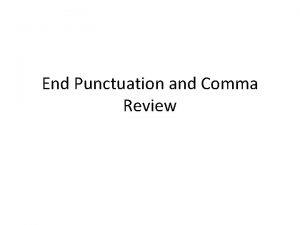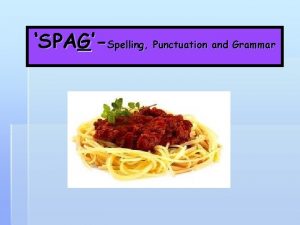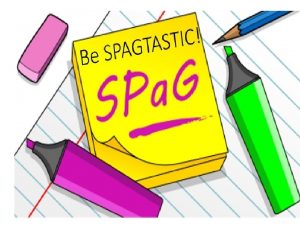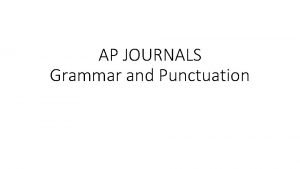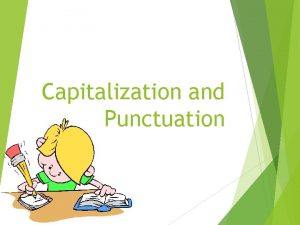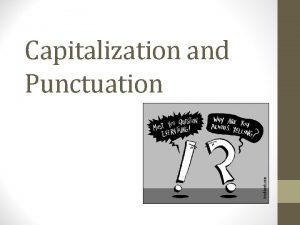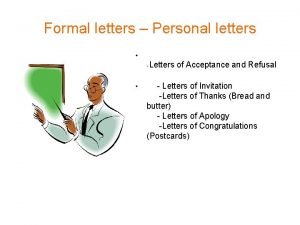Punctuation and Grammar Review Capital Letters Capital letters





































































- Slides: 69

Punctuation and Grammar Review

Capital Letters • Capital letters are used with: – – The first word in a sentence Names of persons and the word “I” Names of particular places Names of the days of the week, months, and holidays – Names of commercial products – Names of organizations such as religious and political groups, associations, companies, unions and clubs – Words in titles of books, magazines, newspapers, articles, stories, poems, films, television shows, songs, papers that you write

Capital Letters * However, a word like a, an, the, but, for, and is, is not capitalized unless it is the first word of the title or the first words after a colon.

Capital Letters Correct the following examples 1. jerry, jill and i went shopping. 2. they like hamburgers 3. christmas falls on december 25 every year. 4. we like to go to the worldbeat center in balboa park. 5. our computer is made by ibm. 6. many people are members of the national association of the deaf. 7. newsweek is an informative magazine. 8. princess: a true story of life behind the veil in saudi arabia is the book we are reading for march’s book club.

Capital Letters Correct the following examples 1. Jerry, Jill and I went shopping. 2. they like hamburgers 3. christmas falls on december 25 every year. 4. we like to go to the worldbeat center in balboa park. 5. our computer is made by ibm. 6. many people are members of the national association of the deaf. 7. newsweek is an informative magazine. 8. princess: a true story of life behind the veil in saudi arabia is the book we are reading for march’s book club.

Capital Letters Correct the following examples 1. Jerry, Jill and I went shopping. 2. They like hamburgers 3. christmas falls on december 25 every year. 4. we like to go to the worldbeat center in balboa park. 5. our computer is made by ibm. 6. many people are members of the national association of the deaf. 7. newsweek is an informative magazine. 8. princess: a true story of life behind the veil in saudi arabia is the book we are reading for march’s book club.

Capital Letters Correct the following examples 1. Jerry, Jill and I went shopping. 2. They like hamburgers 3. Christmas falls on December 25 every year. 4. we like to go to the worldbeat center in balboa park. 5. our computer is made by ibm. 6. many people are members of the national association of the deaf. 7. newsweek is an informative magazine. 8. princess: a true story of life behind the veil in saudi arabia is the book we are reading for march’s book club.

Capital Letters Correct the following examples 1. Jerry, Jill and I went shopping. 2. They like hamburgers 3. Christmas falls on December 25 every year. 4. We like to go to the Worldbeat Center in Balboa Park. 5. our computer is made by ibm. 6. many people are members of the national association of the deaf. 7. newsweek is an informative magazine. 8. princess: a true story of life behind the veil in saudi arabia is the book we are reading for march’s book club.

Capital Letters Correct the following examples 1. Jerry, Jill and I went shopping. 2. They like hamburgers 3. Christmas falls on December 25 every year. 4. We like to go to the Worldbeat Center in Balboa Park. 5. Our computer is made by IBM. 6. many people are members of the national association of the deaf. 7. newsweek is an informative magazine. 8. princess: a true story of life behind the veil in saudi arabia is the book we are reading for march’s book club.

Capital Letters Correct the following examples 1. Jerry, Jill and I went shopping. 2. They like hamburgers 3. Christmas falls on December 25 every year. 4. We like to go to the Worldbeat Center in Balboa Park. 5. Our computer is made by IBM. 6. Many people are members of the National Association of the Deaf. 7. newsweek is an informative magazine. 8. princess: a true story of life behind the veil in saudi arabia is the book we are reading for march’s book club.

Capital Letters Correct the following examples 1. Jerry, Jill and I went shopping. 2. They like hamburgers 3. Christmas falls on December 25 every year. 4. We like to go to the Worldbeat Center in Balboa Park. 5. Our computer is made by IBM. 6. Many people are members of the National Association of the Deaf. 7. Newsweek is an informative magazine. 8. princess: a true story of life behind the veil in saudi arabia is the book we are reading for march’s book club.

Capital Letters Correct the following examples 1. Jerry, Jill and I went shopping. 2. They like hamburgers 3. Christmas falls on December 25 every year. 4. We like to go to the Worldbeat Center in Balboa Park. 5. Our computer is made by IBM. 6. Many people are members of the National Association of the Deaf. 7. Newsweek is an informative magazine. 8. Princess: A True Story of Life Behind the Veil in Saudi Arabia is the book we are reading for March’s Book Club.

Apostrophe The main uses of apostrophes are: • to show the omission of one or more letters in a contraction – do + not = don’t – is + not = isn’t – that + is = that’s • • to show ownership or possession Ellen’s books Dorothy’s pen Howard’s hands

Apostrophe 1. I will not go to the pool today. 2. Please pass me the paper that belongs to Kristin. 3. They did not like their dinner. 4. This is the dog that Paul owns. 5. She was not at school today. 6. What is your name? 7. The students should not forget their books.

Apostrophe 1. I won’t go to the pool today. 2. Please pass me the paper that belongs to Kristin. 3. They did not like their dinner. 4. This is the dog that Paul owns. 5. She was not at school today. 6. What is your name? 7. The students should not forget their books.

Apostrophe 1. 2. 3. 4. 5. 6. 7. I won’t go to the pool today. Please pass me Kristin’s paper. They did not like their dinner. This is the dog that Paul owns. She was not at school today. What is your name? The students should not forget their books.

Apostrophe 1. 2. 3. 4. 5. 6. 7. I won’t go to the pool today. Please pass me Kristin’s paper. They didn’t like their dinner. This is the dog that Paul owns. She was not at school today. What is your name? The students should not forget their books.

Apostrophe 1. 2. 3. 4. 5. 6. 7. I won’t go to the pool today. Please pass me Kristin’s paper. They didn’t like their dinner. This is Paul’s dog. She was not at school today. What is your name? The students should not forget their books.

Apostrophe 1. 2. 3. 4. 5. 6. 7. I won’t go to the pool today. Please pass me Kristin’s paper. They didn’t like their dinner. This is Paul’s dog. She wasn’t at school today. What is your name? The students should not forget their books.

Apostrophe 1. 2. 3. 4. 5. 6. 7. I won’t go to the pool today. Please pass me Kristin’s paper. They didn’t like their dinner. This is Paul’s dog. She wasn’t at school today. What’s your name? The students should not forget their books.

Apostrophe 1. 2. 3. 4. 5. 6. 7. I won’t go to the pool today. Please pass me Kristin’s paper. They didn’t like their dinner. This is Paul’s dog. She wasn’t at school today. What’s your name? The students shouldn’t forget their books.

Quotation Marks • Use quotation marks when you want to show the exact words of a speaker or writer. Place all commas and periods inside of the quotation marks.

Quotation Marks “The only dumb question”, the instructor said, “is the one you don’t ask”.

Quotation Marks “The only dumb question”, the instructor said, “is the one you don’t ask”. “The only dumb question, ” the instructor said, “is the one you don’t ask. ”

Quotation Marks • Use quotation marks when you want to quote or show the titles of short stories, novellas, articles, chapter titles in books, poems, television shows, songs, and papers that you write.

Quotation Marks I read the poem The Tyger, the other day.

Quotation Marks I read the poem The Tyger, the other day. I read the poem “The Tyger” the other day.

Italics/Underline • Use Italics or underline to show the titles of books, magazines, newspapers, plays, art masterpieces, and long musical compositions.

Italics/Underline The novel, “Gone with the Wind, ” was extraordinary.

Italics/Underline The novel, “Gone with the Wind, ” was extraordinary. The novel, Gone with the Wind, was extraordinary.

Commas • Commas often show a pause in a sentence. There are eight main uses of the comma: 1. to separate items in a series – I like elephants, whales, and dolphins. 2. to set off introductory material – First, we will take our test.

Commas 3. on both sides of words that interrupt the flow of thought in a sentence • Mountain Dew, my favorite drink, has a lot of caffeine. 4. between two complete thoughts connected by and, but, for, nor, so, yet • I love to watch basketball, but I do not play it.

Commas 5. to set off a direct quotation from the rest of a sentence • According to King Jordan, “Deaf people can do anything - except hear. ” 6. in dates • April 13, 1982 7. in addresses • My address is 8203 Running Creek Court, Springfield, VA, 22153. 8. in the openings and closings of letters • Dear Pauline, . . Sincerely, Jeff

Nouns • A noun is the name of any person, place, or thing. • The first letters of some nouns are capitalized to show a specific name or title (Greg). These are called proper nouns. Other nouns that are not specific do not use a capital letter (man). These are called common nouns.

Nouns • The main noun or pronoun of a sentence is the Simple Subject (S. S. ) • The S. S. tells us who or what the sentence is about. Every sentence has a S. S. • Nouns that have a singular and plural form are called count nouns. Nouns that only have a singular form are called non-count nouns.

Nouns • Examples – person : teacher – place : school – thing : book The teacher was nice. We learn at school. Take your book. My hunger was unbearable. Their love was strong. I’d like to go for a walk.

Nouns • Examples – person : teacher – place : school – thing : book The teacher was nice. We learn at school. Take your book. My hunger was unbearable. Their love was strong. I’d like to go for a walk.

Simple Subject (S. S. ) What nouns or pronouns bellow are Simple Subjects? - The teacher was nice. - We learn at school. - Take your book. - My hunger was unbearable. - Their love was strong. - I’d like to go for a walk.

Simple Subject (S. S. ) - The teacher was nice. - We learn at school. - (You)Take your book. - My hunger was unbearable. - Their love was strong. - I’d like to go for a walk.

Nouns • Examples – count nouns : hands, cars, books – non-count nouns : homework, rice, water – She has some books. – She has some rice.

Nouns • Examples – count nouns : hands, cars, books – non-count nouns : homework, rice, water – She has some books. – She has some rices.

Nouns • Examples – count nouns : hands, cars, books – non-count nouns : homework, rice, water – She has some books. – She has some rices. She has some rice.

Articles • The 3 most used adjectives A, An, The • “A” and “An” are used before general or nonspecific people, animals, things and places. • “A” is used before words that begin with consonants. A book • “An” is used before words that begin with vowels. An apple • “The” is used before specific names of people, animals, things and places.

Articles What article do I use? A, An, The I have _ homework assignment to do tonight. I saw _ elephant while on safari. We went to _ mall.

Articles I have a homework assignment to do tonight. I saw an elephant while on safari. We went to the mall.

Pronouns • A pronoun is a word that is used in place of a noun. Find pronouns bellow and add them where needed. Yolanda did the homework. Thomas Jefferson lived on his family farm. Don’t forget about Tina and me.

Pronouns • A pronoun is a word that is used in place of a noun. – I did the homework. – He lived on his family farm. – Don’t forget about us.

Adjectives • Adjectives are words that modify (describe) nouns or pronouns – Adjectives tell what kind, how many, or which one – In English, adjectives usually come before the words they describe – In English, adjectives are never plural even when the nouns they describe are plural

Adjectives Find adjectives bellow: amazing universe nine planets confused boy purple flower

Adjectives Examples: amazing universe nine planets confused boy purple flower

Adverbs • Adverbs are words that modify (describe) verbs, adjectives, or other adverbs. • In English, adverbs can come before or after the words they modify • Most adverbs end in ly

Adverbs • Adverb Questions When? How long? To where? How little? How often? Where? From where? How much?

Adverbs • Examples: 1. We were extremely excited. • How excited were we? 2. I thought of her frequently. 3. She moved forward. 4. They are going to the mall today.

Adverbs • Examples: 1. We were extremely excited. • How excited were we? 2. I thought of her frequently. • How often did I think of her? 3. She moved forward. 4. They are going to the mall today.

Adverbs • Examples: 1. We were extremely excited. • How excited were we? 2. I thought of her frequently. • How often did I think of her? 3. She moved forward. • Where did she move? 4. They are going to the mall today.

Adverbs • Examples: 1. We were extremely excited. • How excited were we? 2. I thought of her frequently. • How often did I think of her? 3. She moved forward. • Where did she move? 4. They are going to the mall today. • When are they going?

Adverbs • Examples: 1. We were extremely excited. • How excited were we? 2. I thought of her frequently. • How often did I think of her? 3. She moved forward. • Where did she move? 4. They are going to the mall today. • When are they going?

Verbs • Most verbs show action Example: – Harriet Tubman escaped from slavery.

Verbs • Some verbs show the state of being or links the subject to other words in the sentence. That means that they tell us something that is happening now, present, or in the past. We call theme linking verbs. Example She was an African-American.

Verbs • Some verbs help the action verb to express ability, possibility, or a chance that something may happen. We call them helping verbs. Example: A hurricane can cause a lot of damage.

Verbs • The verb is the main word in the predicate part of the sentence. The main verb is the Simple Predicate (S. P. ) • Every sentence has a Simple Predicate. • The verb also shows time which is called tense. The form of the verb or its tense can tell when the action takes place.

Simple Predicate (S. P. ) Find the S. P. in the sentences bellow. -The teacher was nice. - We learn at school. - Take your book. - My hunger is unbearable. - Their love was strong. - I’d like to go for a walk.

Simple Predicate (S. P. ) -The teacher was nice. - We learn at school. - Take your book. - My hunger is unbearable. - Their love was strong. - I’d like to go for a walk. (would)

Verbs Present Simple watch/watches Past Simple watched Future Simple will watch Present Perfect has/have watched Past Perfect had watched Future Perfect will have watched Present Continuous is/am/are watching Past Continuous watching Future Continuous will be watching Present Perfect Past Perfect Continuous (Progressive) has/have been watching had been watching Future Perfect Continuous (Progressive) will have been watching

Subject-Verb Agreement • In English, the subject and verb of a sentence must agree. In the present tense, all singular subjects except I and you require that you add ‘s’ or ‘es’ to the verb. If the subject is plural, do not add ‘s’ or ‘es’ to the verb.

Subject-Verb Agreement First person singular I don’t add -s to the verb I run First person plural we don’t add -s to the verb we run Second person singular/plural you don’t add -s to the verb you run Third person plural they don’t add -s to the verb They run Third person singular he she it add -s to the verb He runs She runs It runs

Subject-Verb Agreement Remember, most nouns use -s or -es to show plurality while verbs do not. If your sentence has an -s on the subject and an -s on the verb, your sentence is probably wrong. Example: Students learns about photosynthesis.

Subject-Verb Agreement Remember, most nouns use -s or -es to show plurality while verbs do not. If your sentence has an -s on the subject and an -s on the verb, your sentence is probably wrong. Example: Students learns about photosynthesis.

Subject-Verb Agreement Remember, most nouns use -s or -es to show plurality while verbs do not. If your sentence has an -s on the subject and an -s on the verb, your sentence is probably wrong. Example: Students learn about photosynthesis.
 Grass sky and root letters
Grass sky and root letters Comma after unfortunately
Comma after unfortunately Pat grammar and punctuation
Pat grammar and punctuation Linear grammar
Linear grammar Linguistics vs traditional grammar
Linguistics vs traditional grammar Type 0 grammar is called unrestricted grammar
Type 0 grammar is called unrestricted grammar Right linear grammar
Right linear grammar Sat apostrophe practice
Sat apostrophe practice Quick grammar review
Quick grammar review H.grammar review
H.grammar review Personal noun
Personal noun Grammar review powerpoint
Grammar review powerpoint Kahoot.itwww
Kahoot.itwww Grammar review task 1
Grammar review task 1 Interrogative adverbs
Interrogative adverbs Capital community college grammar
Capital community college grammar Physical review letters
Physical review letters Letters from rifka setting
Letters from rifka setting Rewrite each sentence using the correct punctuation
Rewrite each sentence using the correct punctuation Microsoft word process
Microsoft word process Memo initials
Memo initials Introduction of working capital
Introduction of working capital Difference between capital reserve and reserve capital
Difference between capital reserve and reserve capital Multinational cost of capital and capital structure
Multinational cost of capital and capital structure Difference between capital reserve and reserve capital
Difference between capital reserve and reserve capital Variable capital examples
Variable capital examples Multinational cost of capital and capital structure
Multinational cost of capital and capital structure Chapter review motion part a vocabulary review answer key
Chapter review motion part a vocabulary review answer key Uncontrollable spending ap gov
Uncontrollable spending ap gov Nader amin-salehi
Nader amin-salehi What is inclusion and exclusion
What is inclusion and exclusion Narrative review vs systematic review
Narrative review vs systematic review Aztec farming
Aztec farming Literature review on capital market
Literature review on capital market However and punctuation
However and punctuation Full block mixed punctuation letter
Full block mixed punctuation letter Deparchure
Deparchure Indirect speech
Indirect speech Sales letter in business communication
Sales letter in business communication Shurley english punctuation rules
Shurley english punctuation rules Is frappuccino capitalized
Is frappuccino capitalized Ap style quotation marks
Ap style quotation marks Word choice and punctuation in a cartoon
Word choice and punctuation in a cartoon Rules of punctuation and capitalization
Rules of punctuation and capitalization Punctuation marks quotes
Punctuation marks quotes Regulatory capital vs economic capital
Regulatory capital vs economic capital Regulatory capital vs economic capital
Regulatory capital vs economic capital Capital allocation line vs capital market line
Capital allocation line vs capital market line Yes i said yes i will yes traduzione
Yes i said yes i will yes traduzione Instead of punctuation
Instead of punctuation You control your destiny you don't need magic to do it
You control your destiny you don't need magic to do it Math punctuation
Math punctuation Sat punctuation practice
Sat punctuation practice Comma rules sat
Comma rules sat Parenthetical expression
Parenthetical expression Punctuation is important
Punctuation is important Punctuation marks make meaning clear.
Punctuation marks make meaning clear. S s sentence formula
S s sentence formula What are ellipses used for
What are ellipses used for Punctuate sentences
Punctuate sentences 14 punctuation marks ppt
14 punctuation marks ppt Name of teacher
Name of teacher ... punctuation name
... punctuation name Kung fu punctuation question mark
Kung fu punctuation question mark Examples of punctuation context clues
Examples of punctuation context clues Punctuation of compound sentences
Punctuation of compound sentences Punctuation cheat sheet
Punctuation cheat sheet Chapter 27 punctuation semicolons answers
Chapter 27 punctuation semicolons answers What is the use of a apostrophe
What is the use of a apostrophe But however although
But however although
